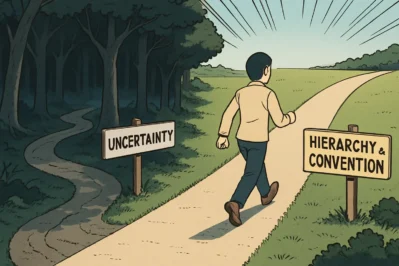Korea’s Need for Certainty: Deconstructing Society Through a Cultural Lens
Hello! Welcome to [Maeil Hangeul], your guide to upgrading your Korean proficiency to a native-like level!
Today, we’re moving beyond simple vocabulary and grammar to explore a concept that forms the very bedrock of Korean society. Have you ever wondered why planning is so meticulous in Korea, why social rules seem so defined, or why personal connections are incredibly powerful? The answer lies in a key anthropological concept: uncertainty avoidance. Nowadays in Korea, while the surface seems to be changing rapidly with global trends, understanding this deep cultural undercurrent is essential for anyone wishing to truly comprehend the nation’s social and professional dynamics. Let’s dive in!
Core Concepts for Cultural Analysis
Here are the essential terms you need to master to discuss Korean culture on an academic level.
- 한국어 표현: 불확실성 회피 (성향)
- 발음 [로마자]: Bul-hwak-sil-seong Hoe-pi (Seong-hyang)
- 영어 뜻: Uncertainty Avoidance (Tendency)
- 상세 설명: This is a term from Geert Hofstedes cultural dimensions theory. It describes the degree to which a society feels threatened by ambiguous or unknown situations and tries to avoid them. Korea scores very high on this index, meaning the culture has a low tolerance for unpredictability. This manifests as a preference for explicit rules (even if not always followed), detailed planning, a belief in absolute truths, and a low acceptance of deviant ideas or behaviors. It is the foundational concept for understanding everything else we’ll discuss today.
-
한국어 표현: 관행
- 발음 [로마자]: Gwan-haeng
- 영어 뜻: Custom; Convention; Established Practice
-
상세 설명:
관행refers to the unwritten, established way of doing things that provides social predictability. It’s more than just a tradition; it’s the accepted procedure or protocol in social and professional settings. Following관행is crucial because it minimizes ambiguity and the risk of making a social faux pas. Deviating from it can be seen as disruptive or even disrespectful, as it introduces uncertainty into a situation. -
한국어 표현: 위계질서
- 발음 [로마자]: Wi-gye-jil-seo
- 영어 뜻: Hierarchy; Hierarchical Order
-
상세 설명: A clearly defined
위계질서is a powerful tool for avoiding uncertainty. It provides a rigid framework for social interaction where everyone understands their role, responsibilities, and the appropriate way to communicate (e.g., the complex honorifics system, or 높임말). This structure minimizes the potential for conflict and ambiguity that can arise in more egalitarian, unstructured interactions. -
한국어 표현: 연고 (학연, 지연, 혈연)
- 발음 [로마자]: Yeon-go (Ha-gyeon, Ji-yeon, Hyeo-ryeon)
- 영어 뜻: Personal Connections/Ties (based on school, region, and blood)
- 상세 설명: In a high-uncertainty-avoidance society, trust is paramount.
연고refers to the networks of trust built on shared backgrounds. Relying on people within your연고network (from your university, hometown, or family) is a strategy to reduce the risk and uncertainty of dealing with strangers. These connections provide a predictable and reliable safety net for everything from business deals to personal advice.
Example Dialogue
Here’s how these concepts might play out in a conversation between a senior researcher, Dr. Kim (A), and a junior researcher, Ms. Park (B), at a think tank.
A (Dr. Kim): 박 연구원, 이번 국제 컨퍼런스 발표 준비는 어떻게 되어가고 있습니까? 기존의 관행대로라면, 우리 연구소의 공식적인 입장만 간략히 정리해서 발표해야 합니다.
(Ms. Park, how are the preparations for the international conference presentation coming along? According to established practice, you should be presenting a summary of our institute’s official stance.)
B (Ms. Park): 네, 준비 중입니다만, 제 개인적인 분석을 추가하고 싶습니다. 조금 더 비판적인 시각을 제시하는 것이 학문적 논의를 활성화하는 데 도움이 될 것 같아서요.
(Yes, I’m working on it. However, I’d like to add my personal analysis. I feel presenting a more critical perspective could help stimulate academic discussion.)
A (Dr. Kim): 음… 그건 우리 연구소의 위계질서상 조금 위험할 수 있습니다. 공식 발표에서 개인의 돌출 행동은 조직 전체의 입장에 대한 불확실성을 야기하니까요. 특히 해외 학자들 앞에서 말이죠.
(Hmm… that could be a bit risky given our institute’s hierarchy. An individual’s unexpected action in an official presentation creates uncertainty about the organization’s unified stance, especially in front of foreign scholars.)
B (Ms. Park): 그렇군요. 그렇다면 혹시 소장님과 같은 학교 출신 연고를 활용해서, 제 아이디어를 비공식적으로 먼저 공유하고 반응을 확인해 볼 수 있을까요?
(I see. In that case, could I perhaps leverage our shared connection—the fact that you graduated from the same university as the director—to informally share my idea with him first and gauge his reaction?)
A (Dr. Kim): 좋은 생각입니다. 제가 먼저 소장님께 말씀드려 불확실성을 최소화하는 방향으로 논의를 이끌어보겠습니다.
(That’s a good idea. I will speak to the director first to steer the discussion in a way that minimizes uncertainty.)
Culture Tip & Deeper Analysis
The Paradox of “Palli-Palli” (빨리빨리): Korea’s famous “hurry, hurry” culture might seem chaotic, but it is paradoxically driven by uncertainty avoidance. The intense desire to get things done quickly is often an attempt to fast-forward through the uncomfortable, uncertain process and arrive at a definite result as soon as possible. It’s about reducing the duration of uncertainty.
Modern Manifestations in the Digital Age: The concept of 연고 is adapting. While traditional ties remain important, today’s Z generation in Korea forms powerful online communities and fandoms. These digital tribes function as new forms of 연고, providing members with trusted information, social validation, and a predictable in-group environment, thereby reducing the uncertainties of navigating the vast and often anonymous digital world. When looking for a reliable review of a product, a young Korean might trust a post from a long-time member of their favorite online café more than a professional critic.
Wrap-up & Practice
Today, we analyzed how the core principle of 불확실성 회피 (uncertainty avoidance) is the key that unlocks the logic behind Korean social structures like 관행 (convention), 위계질서 (hierarchy), and 연고 (connections). Understanding this will elevate your comprehension of Korean society from simply observing behaviors to analyzing the deep motivations behind them.
Now, let’s put your new knowledge to the test!
- Critical Thinking: A Korean company is merging with an American company known for its flexible work hours and flat organizational structure. Based on the concept of
불확실성 회피and위계질서, what potential cultural clashes do you foresee? -
Sentence Analysis: Read the following sentence: “그 부서는 새로운 시도를 꺼리는 경향이 있는데, 이는 수십 년간 이어져 온 관행을 깨고 싶지 않기 때문이다.” (That department tends to be reluctant to try new things because they don’t want to break the established practices that have been in place for decades.)
- How does this sentence illustrate the relationship between
관행and uncertainty avoidance?
- How does this sentence illustrate the relationship between
Share your answers and any personal experiences related to today’s topic in the comments below! We’d love to hear your insights.






